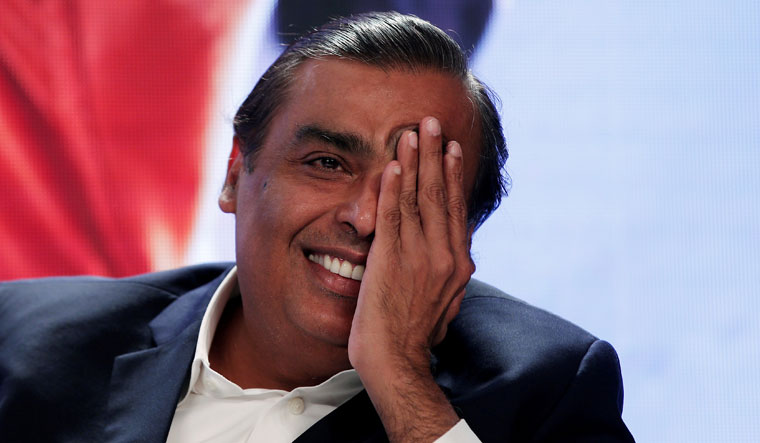The 21st century is going to be the Indian century,” said Amazon’s Jeff Bezos during a visit to India in January 2020. He might have figured it out long before, as his investments are not limited to the billions of dollars he pumped into Amazon’s Indian business. Amazon Holdings, for instance, acquired a 5 per cent stake in department store chain Shoppers Stop in 2017. A year later, it acquired the hypermarket chain More from Aditya Birla Group through Samara Capital. In 2019, it picked up a 49 per cent stake in retailer Future Group’s promoter company Future Coupons.
Amazon is now aggressively wooing small and neighbourhood merchants to its platform with the Local Shops on Amazon programme launched in April 2020. In a year, it has brought in 50,000 offline sellers and neighbourhood shops. “We have been very excited by the success of this programme, which we launched during Covid. It has been adopted by tens and thousands of local shops around us. We are committing to bringing one million local shops online on Amazon by 2025,” said Amit Agarwal, senior vice president and country manager of Amazon India.
Amazon’s push to partner with the vast, unorganised brick and mortar retail market is hardly surprising. Mukesh Ambani’s Reliance Industries last year launched JioMart, an e-commerce platform, which has inked partnerships with a million merchants. Then there is Flipkart, now owned by the American supermarket giant Walmart, which is also going hyperlocal through its Flipkart Quick Service. It is ramping up Flipkart Wholesale, its digital B2B marketplace, and has recently started offering grocery on the app.
Sandeep Karwa, Flipkart’s vice president, said hyperlocal capabilities could enhance the online shopping experience for consumers and boost supply chain operations for e-commerce companies. “It is important to explore ecosystem partnerships to strengthen such capabilities and accelerate faster, reliable deliveries to customers,” he said.
Consulting firm RedSeer estimates India’s grocery market to grow at an 8 per cent compounded rate to $850 billion by 2025, compared with $573 billion in 2020. About 95 per cent of this market in the country belongs to neighbourhood grocery stores. “With a view to expanding consumer franchise, large online players have tied up with small retailers and invested in creating omnichannel platforms. Apart from better service, this also provides additional access delivery points at low cost for a B2C (business-to-consumer) or B2B (business-to-business) player,” said Harsha Razdan, partner, KPMG India.
Amazon and Reliance are pumping in crores as they battle to gain a larger share of the consumer pie. Amazon dragged Kishore Biyani’s Future Group to the courts last year after he inked a deal to sell the retail business to Reliance Retail. While a single-judge bench of the Delhi High Court restrained Future Group from going ahead with the deal, a division bench stayed that order. This was later challenged by Amazon in the Supreme Court. The apex court has deferred the hearing till the end of June. Separately, the Singapore International Arbitration Centre is also yet to give its final judgement in the case. A SIAC interim order last year was in favour of Amazon.
According to regulatory filings, Amazon invested Rs11,400 crore in its marketplace platform, wholesale business and payments platform in the financial year 2020. It has also launched a $250 million venture fund. Agarwal said it was going to focus on “three big priorities—SME digitisation, agri-tech innovations to empower farmer productivity and reach and health-tech to provide universal and quality healthcare for citizens.”
The e-tailer has been strengthening Amazon Pay, offering railway tickets and bill payments among other things, and pushing Amazon Pay UPI (unified payments interface) through promotions. It has a popular music and streaming video service, which comes bundled with an Amazon Prime subscription. It also sees a big opportunity in the food delivery business, a market Swiggy and Zomato currently lead. The service, Amazon Food, is available in Bengaluru. A more robust Amazon Pay will push it more into the realm of super apps—applications that offer everything from chats to shopping and payments.
Reliance Retail Ventures has raised Rs47,265 crore, selling a little over 10 per cent stake to investors including Silver Lake Partners, KKR, Mubadala, Abu Dhabi Investment Authority, Singapore’s GIC and General Atlantic. It acquired the furniture e-tailer Urban Ladder and Vitalic Health Private Ltd, which is into pharma distribution, sales and business support services and online pharmacy platform Netmeds. JioMart, which started out as a grocery delivery platform, is being expanded to other categories.
Reliance has a network of more than 12,000 retail outlets. It also owns the iconic British toys retailer Hamleys and holds the rights to sell several luxury fashion brands in India. On the other hand, JioMart gives it a strong presence online, too, “They have the persistence to succeed over the long term,” said Govind Shrikhande, a retail industry veteran.
Neither Amazon nor Reliance has officially talked about developing a super app. But Reliance’s MyJio app has already become a one-stop platform—it allows you to manage Jio mobile and fibre services, make bill payments, transfer money via UPI, stream movies, music and games, and even connect to JioMart. An integration of MyJio and JioMart could help build a super app, said a source.
Tata, too, is said to be developing a super app, where all the Tata brands will converge. Its acquisition of the grocery e-tailer BigBasket will shake up things further.



